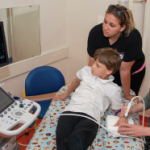Based on membership surveys conducted by our task force, it became clear that our members wanted a pathway to demonstrate their individual competence in MSUS in rheumatology practice. Our task force determined that the most acceptable way to verify professional expertise was via certification. To be certified as competent, professionals must meet minimum criteria and typically pass an assessment.
More than 80% of survey respondents said the ACR should offer MSUS certification for individual rheumatology healthcare providers, and 84% said they would elect to become certified if there were a program available in the U.S. The most important reasons cited to become certified were to:
- Enhance the effectiveness of treatment or diagnosis;
- Learn new skills or knowledge;
- Increase competence in one’s current job;
- Maintain or improve current skills or knowledge;
- Keep up to date professionally;
- Provide proof of competency to show payers/insurers; and
- Expand services provided by the practice/institution.
With the survey results in hand, the task force worked with Castle Worldwide, Inc.—one of the nation’s leading certification and licensure testing companies—to provide a clear definition of the primary domains of competence, specific task statements, and related knowledge and skills required for competent performance as a certified MSUS professional. These definitions supported the development of a specialty certification program and provided a blueprint for what it should assess.
A scan of the current healthcare environment involving MSUS was also performed, and it became apparent that standards for MSUS would be set. The task force also determined that the ACR should develop and set those professional standards for rheumatology. Standards not set by the ACR would be generalized for all uses of MSUS (sports medicine, podiatry, etc.), not just rheumatology. If the ACR wanted to support its members using MSUS as it applied to rheumatology, then the ACR would need to help its members define and demonstrate competence.
After careful consideration of the definitions of competence, the membership survey, and the environmental scan, the ACR’s board of directors decided to move forward with certification and the following goals were established:
- Promote quality of care and patient safety through certification and demonstration of competency of physicians, physician assistants, and nurse practitioners who perform ultrasound as part of their practice in rheumatology;
- Increase the knowledge and improve the competence of physicians, physician assistants, and nurse practitioners that perform ultrasound as part of their practice in rheumatology; and
- Provide a voluntary pathway for physicians, physician assistants, and nurse practitioners who perform ultrasound as part of their practice in rheumatology to demonstrate competence to patients, peers, and payers/insurers.
RhMSUS’s Launch and First Year
In 2012, development of the certification program started and an oversight committee chaired by John FitzGerald, MD, MD, MBA, MPH, PhD, interim chief of rheumatology and associate clinical professor of medicine of the University of California at Los Angeles, was established. With the continued expert consultation of Castle Worldwide, the committee developed policies and procedures following the guidelines of the National Commission for Certifying Agencies and set up the program’s eligibility criteria. Ralf Thiele, MD, associate clinical professor of medicine at the University of Rochester, chaired the examination development groups that developed the secure examination, as well the ACR’s MSUS Task Force.
